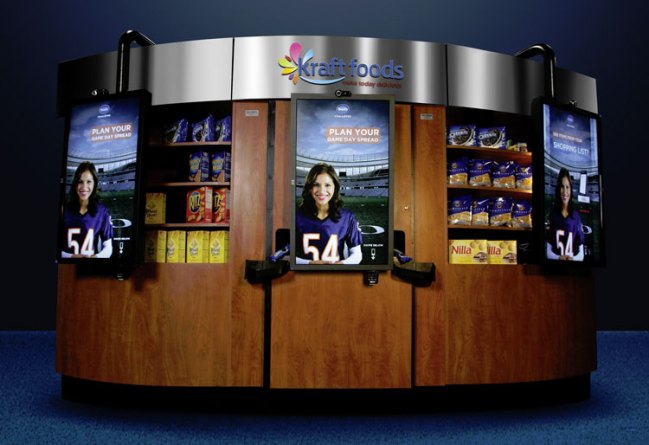
In what must be an attempt to create a robotic Soup Nazi, Kraft has teamed with Intel to make a “Next Generation Meal Planning Solution,” which is fancy speak for a self-service Kraft vending machine that scans your face and determines which delicious Kraft food products you should eat. If you’re as indecisive as I am, this is probably a dream come true.
Unveiled last week at the National Retail Federation, this kiosk prototype will scan your face to determine your gender and age, and combine this data with the current time of day, day of the week, and other factors to recommend the perfect Kraft food for you, reports Business Insider. With more than 100 Kraft product lines at its disposal, it could recommend anything from A.1. Steak Sauce to Velveeta Shells & Cheese. It can also print coupons. We assume you would grab these coupons and probably scan them right back into the machine, making it a device that technically promotes recycling. On the more practical side, the kiosk can dispense product samples as well. Ever wanted to try a Nutta Butter? You’re in luck. Got a hankering for a single Cheez Nip? Kraft has you covered.
The Kraft Kiosk is powered by Intel’s AIM Suite, a video analytics technology built specifically for kiosks like this one. It’s built to anonymously measure things like age, gender, and length of attention to deliver targeted content to those who approach it and track return on investment. Intel is hoping a boatload of companies begin using its technology in kiosks like these.
Does Kraft know you?
The problem with a Kraft-only vending machine is that eating a meal of Oreos, Triscuits, and Mac and Cheese is only fun once, and even then, you usually feel sick before you get to the Triscuits. Then there’s the issue of discrimination. Will a Kraft kiosk recommend Mayonaise to an obese person? Will it spit out Kool-Aid Bursts to any kid that passes by? How does it determine flavor? What if you walk up to the Kraft kiosk, it scans your soul, and recommends…Grated Cheese. How depressed would that make you? Will it warn me that I’m too fat to purchase four cans of Cheez Whiz? Or recommend that I buy the low calorie box of Chips Ahoy? Finally, can it toss the food to me? (That would be fun.)
There have a lot of questions that need answering, but one thing’s for certain, at least you won’t have to speak to a human being. Maybe they’ll make entire stores full of branded kiosks. What an amazing, automated paradise that would be.


